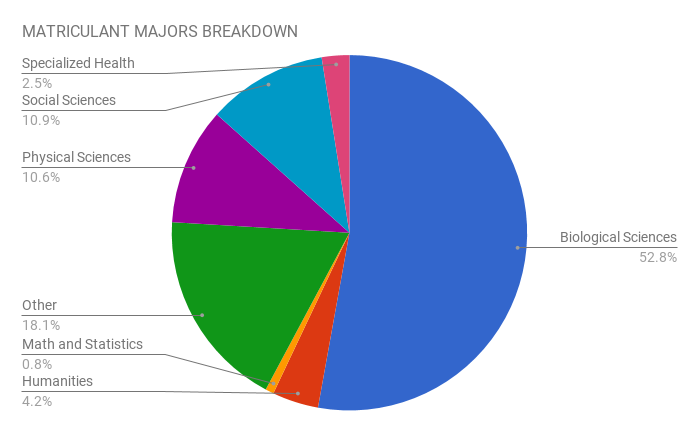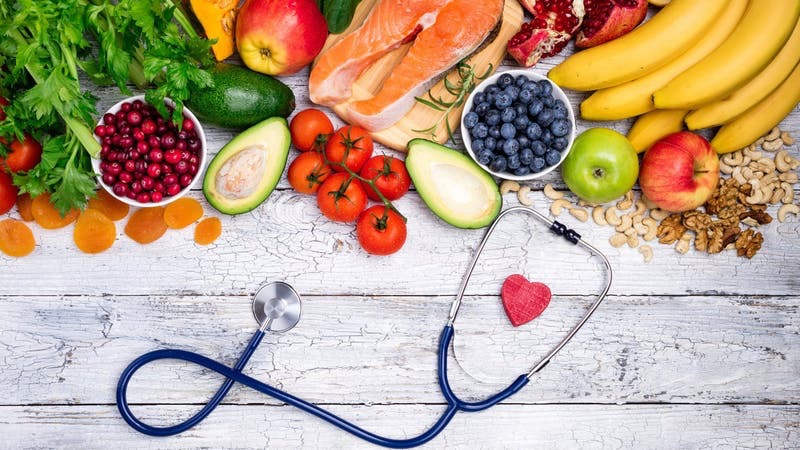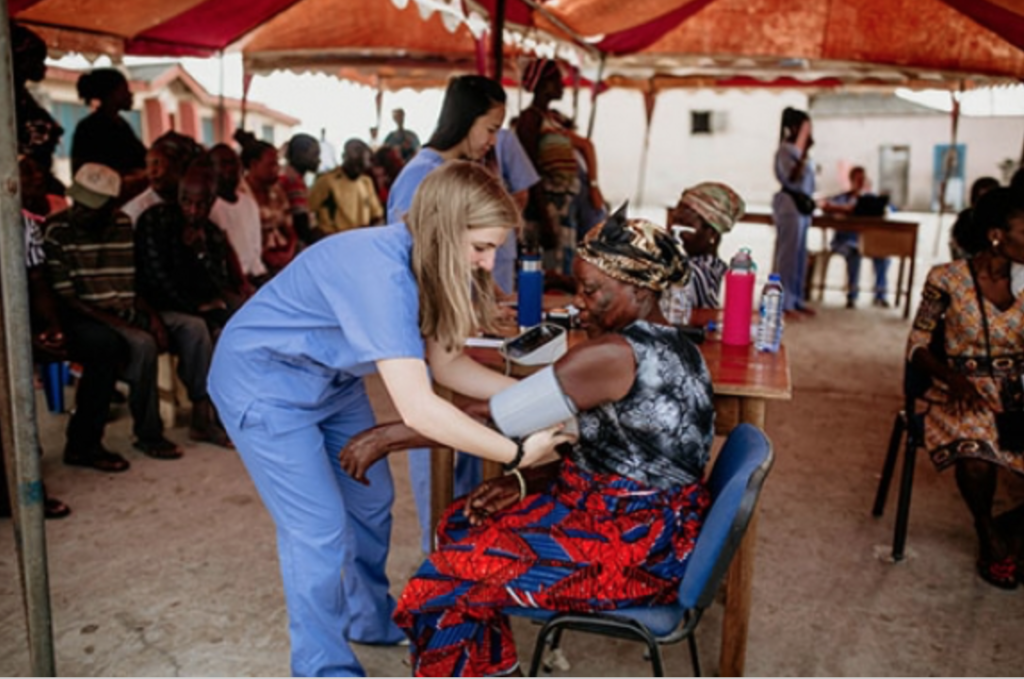ALTERNATIVE MAJORS FOR PRE-HEALTH STUDENTS: PART ONE


source: thestrivetofit.com
BY KATIE LUQUIRE – According to data published by the Association of American Medical Colleges (AAMC), the most popular major for both applicants and matriculants to U.S. medical schools was Biological Sciences, followed by Humanities, Math, and Statistics. While most pre-health students major in some form of science, your major does not matter as much to admission committees as long as you do well in all of the school’s prerequisite courses. The best pre-health major is one that interests you, whether it is one of the traditional pre-health majors, like Biology, or something completely different, like Marketing. The University of Georgia offers many options for majors that are appealing to pre-health students. A few of these include Nutritional Sciences and Human Development and Family Sciences, both of which will be highlighted in this first installment of the Alternative Majors Series.
NUTRITIONAL SCIENCES
How would the major be beneficial to pre-health students?

source: dietdoctor.com
Dr. Rob Pazdro, Assistant Professor, Foods & Nutrition – Diet is a major determinant of a patient’s health, yet many physicians report having inadequate training in this vital area. The Nutritional Sciences program addresses the critical need for nutrition knowledge by providing tomorrow’s physicians, physician assistants, and other health professionals with a foundation in nutrition, metabolism, and health to understand the complex relationship between diet and disease. Our program is based on a scientific approach that empowers students to separate fact from fiction, and ultimately, our students go on to become well-informed health professionals who are positioned to provide optimal care to their patients.
Aashka Sheth, Nutritional Sciences Student – The Nutritional Sciences major is beneficial to pre-health students because it provides a good backbone for many post-grad opportunities. For pre-med students, the major is great because many of the prerequisite or suggested classes for medical school are included in the major and count towards their degree. Nutrition education in medical school is not as comprehensive as it could be, and having this background can help enhance patient care in the future. Not only is the Nutritional Sciences major helpful for students’ professional goals, but it can also have personal benefits. The knowledge gained from classes such as Medical Nutritional Therapy and Public Health Dietetics is directly applicable to life and can help make positive changes in any student’s life.
Study abroad options?
Dr. Rob Pazdro – Our department has several study abroad opportunities. Every summer, Dr. Alex Anderson leads a service-learning program to Ghana, where students gain hands-on experience in hospitals conducting basic health and nutrition screenings. In May to June, Dr. Silvia Giraudo leads a service-learning program to Bolivia, where students complete rotations in hospitals, clinics, or other health faclities while working closely with physicians. We have additional Maymester programs to Italy and England.
Aashka Sheth – There are multiple study abroad options in the Foods and Nutrition department here, but the one that is most related to pre-health is the Ghana service learning program, as Dr. Pazdro mentioned. In Ghana, students have the opportunity to learn a variety of skills that relate to nutrition and public health. The course is designed so that students are able to observe in hospitals as well as help out with health and nutritional screenings.
Research or Patient-Care Opportunities through the major?
Dr. Rob Pazdro – Our department offers a wide range of research opportunities focused on topics ranging from bone health to obesity physiology to disease genetics. Research topics are available on our departmental website, and our faculty are always looking for enthusiastic students to help make discoveries.
HUMAN DEVELOPMENT AND FAMILY SCIENCE
How would the major be beneficial to pre-health students?
Dr. Melissa Kozak, Senior Lecturer, HDFS – Human Development and Family Science uniquely helps students 1) have an understanding of the “whole picture” in interacting with human beings and 2) exhibit qualities of compassion and sensitivity to develop effective relationships with patients of diverse backgrounds. Students develop these qualities by studying human beings’ physical, cognitive and socioemotional development through the lifespan in the context of the most important human environment: families.
Kathy Lee, Fourth Year HDFS Student – Being a part of the HDFS major has given me a very rewarding experience as a pre-health student. I would recommend this major to all pre-health students because learning about the development of people and the different factors that shape society has been an eye-opening experience, especially because I will be working with patients and their families from a wide range of cultures and backgrounds in the future. Another great thing about the HDFS major is that it allows flexibility to take the prerequisites for whatever pre-professional school you are applying for. The advisors and professors are more than willing to sit down with you and help with any questions that you may have!

source: UGA College of Family & Consumer Services
Study abroad options?
Dr. Melissa Kozak – FACS London – Students may complete an internship, and through the internship experience, you will have hands-on engagement with fashion, art and design studios, advertising/public relations/marketing firms, global organizations serving families and children, financial enterprises and more.
Kathy Lee – Studying abroad is an opportunity that is unique to the college experience. The College of Family and Consumer Sciences has multiple opportunities for studying abroad. Specifically for pre-health students, there are service-learning study abroad programs throughout the summer in various countries such as Ghana and Bolivia where students can work with physicians and dietitians while obtaining class credit.
Research or Patient-Care Opportunities through the major?
Dr. Melissa Kozak – HDFS Majors are required to complete an Applied Community or Research Internship.
Previous Community Internship placements include Athens Nurses Clinic, private offices, OT Clinics, PT Clinics, Public Health Offices (e.g. Babies Can’t Wait, Children 1st), hospitals, and camp environments (e.g. diverse populations, camp nurses).
Legislative Aide Program – Although this is not a patient-care opportunity, students 1) earn valuable experience and knowledge of the legislative process while working in a full-time position; 2) learn first-hand how policies affect the everyday lives of Georgians, and 3) enjoy networking opportunities that will impact your academic and future professional career.
Research Internship placements include:
- Social Determinants of Child Development – “We engage in high-quality research, striving to connect the dots between contexts and outcome, placing an emphasis on family relationships and the child’s learning ability.”
- Youth Development Institute – “Our research is focused on the association between early life stress and health risk behaviors versus resilience among youth. We examine how early life stress (e.g., child maltreatment, cultural stress, and victimization) contributes to a child’s conduct via developmental mechanisms that include neuro-biological processes, emotion regulation, impulsivity, personality, and peer relations.”
- Better Brains for Babies – “UGA Extension provides education and resources on early brain development for families, child care providers, and others who care for children.”
Kathy Lee – The HDFS major requires every student to have an internship as a part of their graduation requirement. This is an amazing requirement because getting professional experience for any path after college is so essential now. Through the internship class that I am taking this semester, I have been able to accumulate hands-on patient-care hours at Athens Nurses Clinic! I do the intake for patients before they see the Nurse Practitioners by taking vitals and taking notes for the NPs. I also know lots of other students who have internships with various medical practices.
NEXT: EXERCISE AND SPORT SCIENCE AND BIOMEDICAL ENGINEERING
